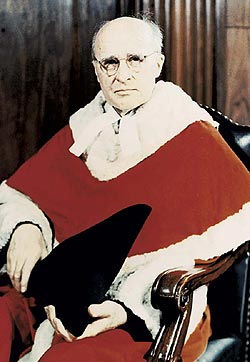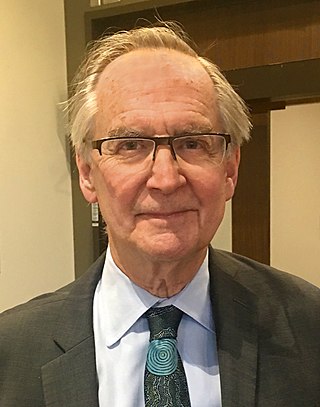
Ivan Cleveland Rand was a Canadian lawyer, politician, academic, and justice of the Supreme Court of Canada. He has been described as "probably the greatest judge in Canada's history".

Harvard College v Canada (Commissioner of Patents) is a leading Supreme Court of Canada case concerning the patentability of higher life forms within the context of the Patent Act. At issue was the patentability of the Harvard oncomouse, a mouse that had its genome genetically altered by a cancer-promoting gene (oncogene). In a 5-4 split, the Supreme Court held that the oncomouse and higher life forms in general are not patentable subject matter in Canada.

William Ian Corneil Binnie is a former puisne justice of the Supreme Court of Canada, serving from January 8, 1998 to October 27, 2011. Of the justices appointed to the Supreme Court in recent years, he is one of the few appointed directly from private practice. On his retirement from the Court, he was described by The Globe and Mail as "arguably the country's premier judge", by La Presse as "probably the most influential judge in Canada of the last decade" and by the Toronto Star as “one of the strongest hands on the court.”

Roncarelli v. Duplessis, [1959] S.C.R. 121, was a landmark constitutional decision of the Supreme Court of Canada. The court held that in 1946 Maurice Duplessis, both Premier and Attorney General of Quebec, had overstepped his authority by ordering the manager of the Liquor Commission to revoke the liquor licence of Frank Roncarelli, a Montreal restaurant owner and Jehovah's Witness who was an outspoken critic of the Roman Catholic Church in Quebec. Roncarelli provided bail for Jehovah's Witnesses arrested for distributing pamphlets attacking the Roman Catholic Church. The Supreme Court found Duplessis personally liable for $33,123.56 in damages plus Roncarelli's court costs.

In contract law, an arbitration clause is a clause in a contract that requires the parties to resolve their disputes through an arbitration process. Although such a clause may or may not specify that arbitration occur within a specific jurisdiction, it always binds the parties to a type of resolution outside the courts, and is therefore considered a kind of forum selection clause.

Dunmore v Ontario (AG), 2001 SCC 94 is a leading Supreme Court of Canada decision on the constitutional right to freedom of association under section 2(d) of the Canadian Charter of Rights and Freedoms ("Charter"). The Court held that the lack of a positive framework that protected farm workers from employer reprisals for exercising their associational rights under the Charter constituted a "substantial interference" of their right to freedom of association. The Ontario government responded with the Agricultural Employees Protection Act, which extended only to agricultural workers and prohibited employer reprisals against employees exercising their rights under section 2(d) of the Charter.

Weber v Ontario Hydro, [1995] 2 S.C.R. 929 is a leading decision of the Supreme Court of Canada where the Court held that a labour arbitration board was a "court of competent jurisdiction" within the meaning of section 24(1) of the Charter, and could grant declarations and damages. Consequently, the board has exclusive jurisdiction over the matter, and so employees cannot bring suits concerning matters under a collective agreement to court.

Arbitration is a formal method of dispute resolution involving a third party neutral who makes a binding decision. The third party neutral renders the decision in the form of an 'arbitration award'. An arbitration decision or award is legally binding on both sides and enforceable in the courts, unless all parties stipulate that the arbitration process and decision are non-binding.

An arbitral tribunal or arbitration tribunal, also arbitration commission, arbitration committee or arbitration council is a panel of unbiased adjudicators which is convened and sits to resolve a dispute by way of arbitration. The tribunal may consist of a sole arbitrator, or there may be two or more arbitrators, which might include a chairperson or an umpire. Members selected to serve on an arbitration panel are typically professionals with expertise in both law and in friendly dispute resolution (mediation). Some scholars have suggested that the ideal composition of an arbitration commission should include at least also one professional in the field of the disputed situation, in cases that involve questions of asset or damages valuation for instance an economist.

Canadian Union of Public Employees, Local 963 v New Brunswick Liquor Corp, [1979] 2 SCR 227 is a leading case decided by the Supreme Court of Canada. This case first developed the patent unreasonableness standard of review in Canadian administrative law.

Canadian administrative law is the body of law "that applies to all administrative decisions, whether issued by front-line officials, ministers, economic regulatory agencies, or administrative tribunals, with interpretations of law and exercises of discretion subject to the same. .. rules." Administrative law is concerned primarily with ensuring that administrative decision-makers remain within the boundaries of their authority and observe procedural fairness.

R v Bryan 2007 SCC 12 is a decision by the Supreme Court of Canada on freedom of expression and Canadian federal elections. The Court upheld a law that prevented the publicizing of election results from some ridings before the polls closed in others.

Canadian Broadcasting Corp v Canada (Labour Relations Board), [1995] 1 S.C.R. 157 is a leading decision of the Supreme Court of Canada on judicial review. The decision affirms the "pragmatic and functional approach" to labour relations and rules that the standard of review for interpreting external legislation should usually be one of correctness.

Toronto (City) Board of Education v Ontario Secondary School Teachers' Federation, District 15, [1997] 1 S.C.R. 487 is a leading decision of the Supreme Court of Canada on judicial review of administrative decisions. The Court held that the review of a just cause dismissal was patently unreasonable on the basis that the decision had no evidentiary basis.
Marc Nadon LL.L. is a supernumerary judge on the Canadian Federal Court of Appeal. He has practised law in both Quebec and the United Kingdom, focusing on maritime and transportation law. He was also an arbitrator and former lecturer in law at the Université de Sherbrooke. Nadon was nominated by Prime Minister Stephen Harper to be a puisne justice of the Supreme Court of Canada in October 2013. Following controversy about the appointment, the federal government referred the constitutionality of the appointment to the Supreme Court of Canada. In their decision in Reference Re Supreme Court Act, ss 5 and 6, the Supreme Court quashed his appointment, concluding he did not meet the eligibility criteria provided in the Supreme Court Act.

Dunsmuir v New Brunswick, 2008 SCC 9, [2008] 1 SCR 190 was, prior to Canada v Vavilov, the leading Supreme Court of Canada decision on the topic of substantive review and standards of review. Dunsmuir is notable for combining the reasonableness (simpliciter) and the patent unreasonableness standards of review into a single reasonableness standard.

Canada v. Khosa, 2009 SCC 12, is a leading Supreme Court of Canada decision in Canadian administrative law.

R v Kang-Brown, [2008] 1 S.C.R. 456, 2008 SCC 18, is a constitutional decision by the Supreme Court of Canada on the limits of police powers for search and seizure. The Court found that police do not have the right to perform a sniffer-dog search of public spaces when such search is not specifically authorized by statute. In this case, a suspect's section 8 rights under the Canadian Charter of Rights and Freedoms ("Charter") were violated when a police officer stopped him at a bus station and sniffer-dog searched his bag finding drugs in his possession.

Euro-Excellence Inc v Kraft Canada Inc, 2007 SCC 37, [2007] 3 S.C.R. 20, is a Supreme Court of Canada judgment on Canadian copyright law, specifically on the issue of indirect infringement and its application to parallel importation. Kraft Canada sued Euro-Excellence Inc. for copyright infringement due to their importation of Côte d’Or and Toblerone chocolate bars from Europe into Canada. A majority of the court found that the copyright claim could not succeed, although they split on whether the claim failed due to the rights of an exclusive licensee or due to the scope of copyright law.

Peace River Hydro Partners v Petrowest Corp, 2022 SCC 41 is a case of the Supreme Court of Canada on the applicability of arbitration laws on the authority of a receiver appointed under the Bankruptcy and Insolvency Act.





